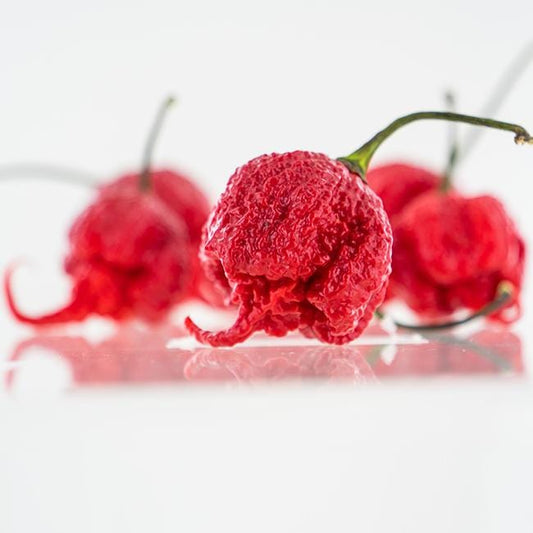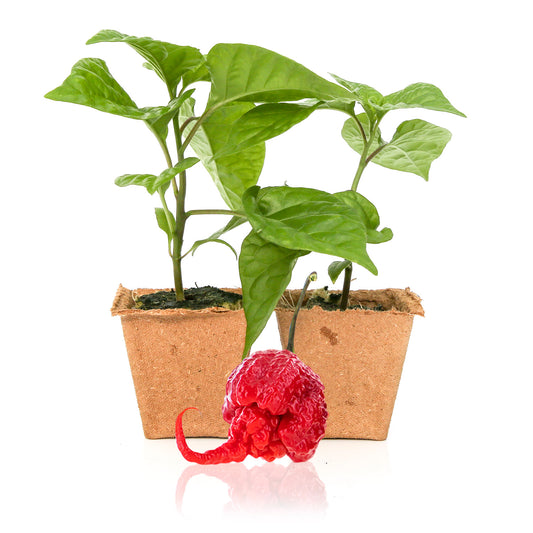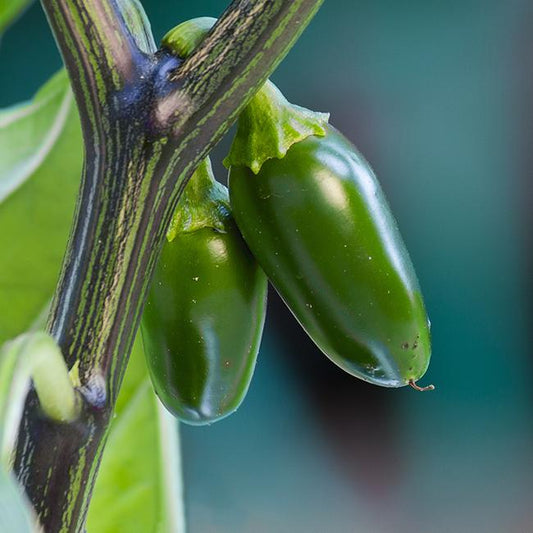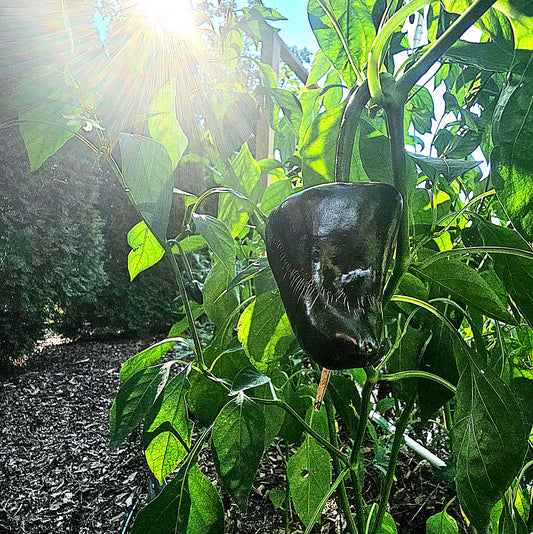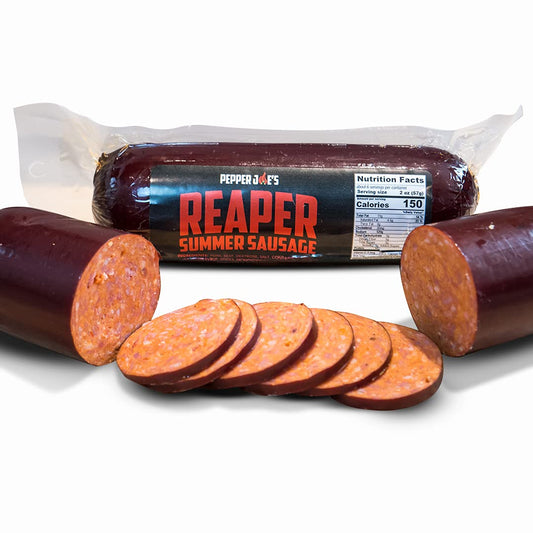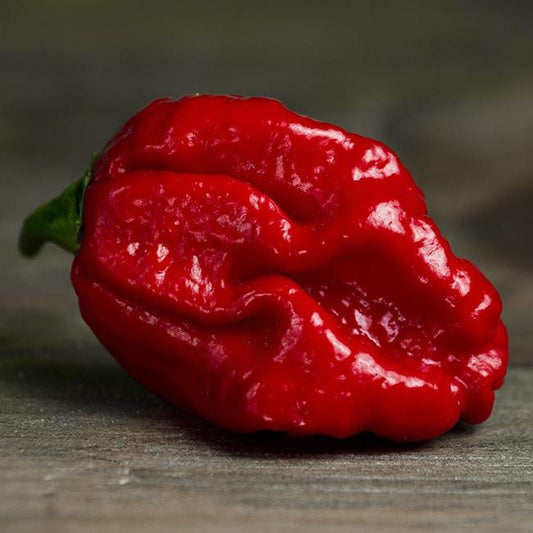Pepper Joe's Gardening Tips - FAQ
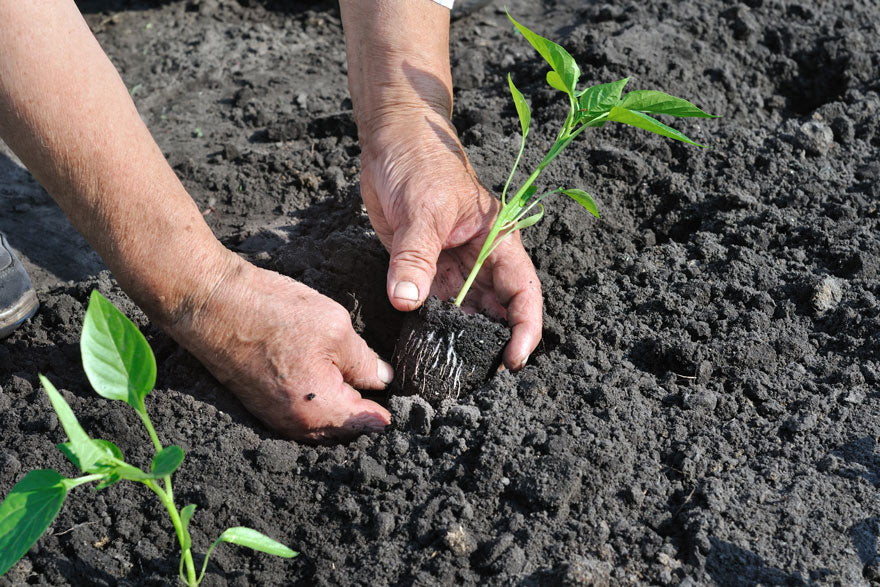
Why FAQ on growing peppers and growing sweet peppers?
I get a lot of mail on a daily basis.
Many of the emails have the same theme....about "How to grow peppers" or "Growing pepper plants in Michigan" or "Planting Bell Peppers in Dallas". I'm committed to answering every question about the 'how to' on growing peppers from seed to growing pepper plants. And growing them WELL. So we do answer every email personally...but with the rush of day to day operations, many answers are short and to the point.
I decided to do this extensive FAQ that probably answers 90% of the most common Hot Pepper Planting questions from A to Z.
I hope it helps.
Epsom Salt and Fertilizers
Dear Pepper Joe,
Oh Master of everything Hot and Spicy, I have a question. You frequently recommend using Epsom salt on Hot Pepper plants. Why and how much should I use? Any other tips, oh wise one, on fertilizers?
M. Wells, Charlotte, NC
Hi M,
Epsom salt delivers a immediate shot-in-the arm of magnesium to the plants and boost growth when applied as a foliar spray. Mix 2 tablespoons of Epsom salt in an average size spray bottle...shake it vigorously and apply to plant every 2 weeks with a thorough soaking. My favorite fertilizer is Fish Emulsion. I like it because it is a great all-around fertilizer and 100% organic. An alternative if Organic isn't important to you is Miracle-Gro or its equivalent.
Use your choice of fertilizer every other week on alternate weeks from the Epsom salt spray. Therefore, your Chile plants are getting fed weekly.
Fiery Regards,
Pepper Joe
Take a look at my video on this cheap and easy fertilizer:
Pesticides
Hi Pepper Joe,
First, let me tell you how happy I am with your germination rates. I bought the Bolivian Rainbow, Peter Pepper, Thai Sun, Turkish Cayenne, Hot lemon and Golden Habanero. By the way...that Golden Habanero is HOT!!! Ouch! Anyway, all peppers plants sprouted and every seed but 2 (I planted maybe 100 seeds) germinated. I've never done so well.
My question is this. My plants have some aphids on the undersides of the leaves. What type of pesticide do you recommend?
Julie
Hey there Julie,
I'm thrilled to hear about your wonderful germination percents. I get a lot of satisfaction when I hear glowing reports like yours. My pesticide of choice is to mix ~ 1+ teaspoon of dish soap in a large spray bottle and apply directly to plants and try to get a direct hit on the bugs. The dish soap is biodegradable and will stick to the plant and linger until you get a rain.
Here's how it works. Soft bodied insects basically breathe through their skin and it suffocates them. With hard bodied insects it gives them a deadly case of dysentery. It works on most insects...very effective on Aphids...and is non toxic to your plants. By the way, it is the Ants that kinda 'Herd' the aphids. They carry them up the plants so the aphids can suck the sap out of the leaves. Then those smart lil' ants 'Milk' the aphids...much as we do with cows. Ants hate citrus rinds...particularly oranges. So make a mix of your leftover citrus peels in the blender with some water and put at the base of the plants. It won't kill the ants but usually they will move on.
Bottling Hot Peppers
What's up Big Pepper Guy?
I have a ton of your Jalapeno peppers and want to put them up in bottles. Any advice?
Duke AKA/ Pepper Stud
Duke,
I get asked this question a lot.
I recycle bottles that I save from other stuff that has a plastic seal at the top...like mayonnaise jars, pickle jars, etc. I like a mixture of 2/3 distilled white vinegar and water. I add 1 tsp. of salt and 1/2 tsp. of turmeric as an added preservative. That is the basic recipe. When I want to get fancy I'll add a few cloves of garlic and bay leaves. Also, picking spice gives it a lot of extra flavor. Experiment and have some fun with it.
Keep the Chile Faith Pepper Stud,
Pepper Joe
Pickling Jalapeño or Cherry Peppers
Freezing Peppers
Can I freeze my peppers? Last year I made a delicious Hot Sauce (from the recipe on your website) but this year I'd like to freeze them and use that way.
Yes, Peppers are easy to freeze.
Just rinse well and let dry. Slice off the stem and a tiny bit of the shoulder...just enough to expose the flesh. Put them in sealed baggies and freeze. When you thaw them out they are like fresh Hot Peppers. They keep well, at least for a year.
Enjoy! If you'd like, watch me prepare my peppers for freezing:
Hot Hands
Pepper Joe,
Help!!!!! I just cut down a bunch of Hot Peppers to dry and my hands are burning. Worse yet, I touched a delicate body part and OH MY...I'm in pain.
Anything to give me fast relief?
Pepper Bob in Arkansas.....Help!!
Pepper Bob,
I can relate. Not that you want to hear this now but an ounce of prevention is worth a pound of cure. Wear plastic gloves next time. For now the best cure I've found is wash your hands in pure dish soap...without water for at least a minute. The dish soap will pull out most of the 'Chile Oil'..like it pulls out grease and oils from dishes. After you start to get some relief rinse off well. Nothing takes 100% of the burn out immediately but this will help.
Pepper Joe
Overwintering Peppers/Growing Indoors
Hi Pepper Joe.
Thanks for answering my last question so quickly about garden pests.
My Peter Peppers are the talk of the neighborhood. I have many of the women in the neighborhood blushing. Ha!
I know you like container gardening. When I brought my Orange Habanero plant indoors many of the leaves fell off. Will it survive?
Worried in Wilmington.
Dear Worried,
NOT to worry. When you bring container grown peppers indoors they go into a state of semi-dormancy. Meaning, they will not grow much...some varieties will continue to ripen for a while...but basically the growth slows down. Initially several varieties drop leaves due to the climatic change. It is not a problem.
The major reason to overwinter plants is to keep them alive and take out in late spring/early summer the following year and get a big jump on production and crop.
Their requirements are few.
Bring plants indoors before first expected frost in a location that gets some sun. Prune the limbs back into 4" 'crotches'. Leave about 8 to 12 of these. Basically you're pruning back about 2/3 of your pepper plants. Water every few weeks while indoors and fertilize lightly about once a month. Below is a good video on over wintering your pepper plants.
They will flourish when you bring them back outdoors. I'm frequently asked if you can grow peppers indoors and the answer is yes. There was a time when I did not recommend it...but with grow lights now and hydroponic gardening indoors.
Fiery Regards,
Pepper Joe
How to Overwinter Your Pepper Plants
Drying Chiles
Hi there Pepper Joe!
I love your website. I visit it often and it always brings a smile to my face. There is so much to do there and it is so informative. I have a large crop of Turkish Cayenne and Pueblo Peppers. Any tips for drying them?
John
Hello John,
Thin skinned varieties dry best. You need to be careful with thick skinned, fleshy varieties such as the Jalapeno or Cherry pepper due to the high moisture content. They can be dried with a food dehydrator. If you don't have one you can try dicing up very tiny and putting in direct sunlight. Don't let them get wet or moist because they will get moldy.
Thin skinned varieties, such as the Cayenne family, however, dry easily.
For example, the Pueblo is so easy to dry I just string them up with a needle and thread placed through the stems and hang them up in a sunny location.
For most other varieties just slice in half, de-seed them and place on paper plates in a sunny windowsill.
Here's a great tip:
It's a good time to mention one of my favorite ways to preserve my Chiles...and the tastiest.
I love to de-seed them, dry them and then roast them slightly for a gourmet, nutty flavored treat.
I use two types of Hot Peppers. Tiny ones like the Thai Sun and Flourescent, I slice in half and cut out the seeds. After drying put them in the oven and broil for about just 30 seconds at about 350 degrees...WATCH THEM CLOSELY...they burn quickly...as soon as they turn slightly black they are done. If you overcook them they start to 'Smoke' and that stuff hurts your lungs.
The other type is thin skinned Cayenne varieties. I cut them in 1/2" x 1/2" squares after de-seeding them and do the same as above.
These dried and roasted Chiles are just awesome in Chicken soup...any soup for that matter...on Spaghetti, Chili, Omelets, actually experiment them in your favorite dishes.
Bon Apetit,
Pepper Joe
Drying Cayenne Peppers
Sulfur as Fertilizer
Big Pepper,
I read in one of your newsletters that you recommend sulfur as a fertilizer. Where can I find it?
Buddy S.
Hey Buddy,
Yes, I love sulfur as a fertilizer. When I transplant my seedlings outdoors I bury a pack of matches...fanned out...a few inches below the roots in the root zone. As the plant grows the roots extend down to the matches and feed off of the sulfur. Between this and my Epsom salt spray, I've grown bell peppers as big as cantaloupes and Hot Peppers with up to 300 little Chiles on one plant.
You can also find sulfur powdered in most drug stores and apply a tablespoon monthly around the base of your Pepper plants. Your Chiles will love ya!
Take Care,
Pepper Joe
Seed Starting Soil Mix
Dear Pepper Joe,
I'm about to plant my seeds and start them indoors. If I want to make my own potting mix do you have any recommendations? I saw you on TV with Dianne Devough-Stokes. Those Yellow Jellybean Peppers looked hot! So did you.
Joanne
Little River, South Carolina
Joanne,
Thanks for the compliment.
There are many commercial potting and seed starting mixes that work real well.
If you want to make your own I like to use the following mixture:
- 1/3 Potting Soil
- 1/3 Sand
- 1/3 Garden soil (needs to be well tilled)
Mix all 3 parts together very well and make sure there are no lumps...to give you a well aerated mixture. Peppers like sand and it gives the roots a good chance to spread out. The garden soil has nutrients for the roots to feed on and the potting soil is nice and friable to prevent compaction. The root zone should be happy with this combination. Watch my Growing Chilies 101 video below to see me make up this perfect soil for your plants.
Great Gardening,
Pepper Joe
Hardening Off
Pepper Joe,
Is it important to harden off my Hot Pepper Plants?
Jimmy Jackson
Jimmy,
This is absolutely KEY. Gardening is mostly common sense. Keep in mind your plants have been in a controlled indoor climate. Probably between 65 and 70 degrees with no wind and partial sunshine through a sunny windowsill in most cases. These are not the conditions outdoors where these tender plants will have 30 degree swings in temperature, direct sunlight and some windy conditions. Not to worry ... just let them adapt GRADUALLY.
I recommend bringing them outdoors the first day for 1/2 hour in just partial sunlight in an area protected by the wind. Some gardeners start out even simpler than this by opening the window where plants are growing a few inches for an hour, then two, then three hours per day. After your plants are outdoors for 1/2 hour somewhat protected increase the time daily to 1 hour, 2, 3, 4, leading up to 8 hours per day. Then leave them out overnight for a full day. As the amount of hours increase you can gradually expose them to more direct sunlight and some wind. Keep in mind the soil will dry faster outdoors due to sun and wind so water more frequently outdoors. The soil in containers will dry faster than your actual actual garden will. This entire process takes about 2 weeks. If there is a thunderstorm or high winds..obviously skip that day. Again your primary objective is to let your plants acclimate gradually to the new outdoor environment.
Pepper Joe
In my Growing Hot Peppers 101, I talk about hardening off:
Transplanting into the Garden
Pepper Joe,
One more question if I'm not bugging you too much. What do you advise for transplanting?
Jimmy
Jimmy,
No problem at all. I love to give direction to our customers to ensure a good crop.
Now that your plants are Hardened off properly you are just about there. Your plants are adjusted to being outdoors and you're moving them to their permanent home. The key now is:
- Don't disturb the roots.
- Create a favorable soil environment.
- Transplant the right depth.
To prepare the soil I like to mix into the hole a healthy shovelful of sand (most tomatoes and peppers originated in a tropical climate..besides sand allows the roots to aerate) and a shovelful of composted cow manure or compost. This will continually feed your plants throughout the growing season. Handle the roots gingerly and place into hole about 1" above the established root line so that more of the plant is underground than when in pots. Tomatoes and peppers will grow additional roots from the stem that is now underground. This will "anchor" the plant better and it will grow stockier. Immediately water the plants well at the soil level. It's best to do your transplants at early evening so that they are not immediately in full sunlight.
Watch the transplants closely the first week. If the weather is real hot they'll need more water. If plants start to wilt slightly water them right away. Occasionally I've had to partially shade them if the weather was real hot with a temporary cardboard shelter.
Pepper Joe
Animal Problems
Hi there Pepper Joe,
I've been a Newsletter subscriber to 'Chile News & Views' since the beginning, I guess for about 3 years now. Your advice has taken me from a novice to a semi -novice (: ..just kidding...I do pretty well, actually.
I sometimes have a problem with groundhogs and deer eating my plants. Do you have any way to prevent this?
Suzie Hamilton
Suzie,
They are two determined 'Critters'. There is no 100% solution but I've had success spreading blood meal at the base of my Chiles - the deer, groundhogs, rabbits, etc. don't like crossing a spot that smells like blood or where a carnivore may have been feeding. And putting some human hair in a used pair of nylons around the plants is also a good deterrent. For real serious problems you can buy urine type of applications from predators, such as coyote.
Good Luck and Great Gardening,
Pepper Joe
Pruning/Overwintering Peppers
Dear PJ,
I read somewhere that you say it is OK to prune pepper plants to extend the season and increase yield in colder weather areas in particular. Can you explain?
Sissie Spellman
Hancock, Maine
Hey There Sissie,
Most people don't know you can prune pepper plants. About six weeks before the first frost, snip back top branches and flowers. The plant strength will go to existing peppers, not new growth, and remaining peppers will mature faster. A garage or basement is ideal. Green peppers will ripen right on the plant. This is a good tip for shorter season gardeners. Watch my YouTube video on this:
Pepper Joe
Container Gardening
Hi Pepper Joe.
You seem to be a big fan of container gardening. Can you tell me why and also which peppers do you recommend for containers?
I took your "Pepper Joe Trivia Test" and scored a perfect score. Do I get anything?
Thank you,
George Demographolis from UK
Hi George,
I am a big fan of container gardening. Anyone can grow Chiles from seeds anywhere in containers...even if you live in a condo or apartment and have limited space.
If you have a small garden this is a way to increase your yield.
I like a 5 gallon size for most peppers. You start the seeds indoors than transfer your seedlings to the container after danger of the last frost is over. Make certain to harden them off properly first.
Most varieties of peppers do well in containers.
However, the more compact the plant is the better it does.
Some of my Habaneros grow to 6' and 7' tall. Obviously these would fall short of ideal for container gardening because they would be top heavy. However my Orange Habanero is more compact and does well.
My #1 choice for containers is my Thai Sun. It grows to 1' high and just about as wide. It is perfect for this type of gardening. Here's some others that are ideal: Hot Lemon, Jalapeno, Cherry, Tabasco, Mushroom, Pasilla, Charleston, Flourescent, and the Peter Pepper. The Peter Pepper is definitely rated XXX and is not for customers who are too modest. (:
Watch me talk more about growing peppers in containers:
Fiery Regards,
Pepper Joe
Free Seeds, Treated Seeds
Greetings from Bermuda Pepper Joe.
Are your seeds treated? I ordered from you last year and received Free Seeds. Do you still send them with every order?
David
Hi David,
My seeds are not treated. I have a problem with treated seeds being labeled "not fit for human or animal consumption". What in the world do they put on those seeds that you can't eat them? Maybe I don't want to know.
My seeds are dried with a little sunshine and plenty of fresh air. I hand select them and choose only the finest specimens. Seeds have survived and reproduced for millions of years without being treated. Some have been found in Egyptian tombs that were thousands of years old and they still germinated...they were not 'treated'.
The seeds are a combination of Family Heirloom seeds that I don't offer in the catalog, seeds we are still testing to sell in the future, some from customers that we haven't offered for sale yet, etc. Just a fun, diverse bunch of seeds that customers are delighted to get for frees.
Enjoy your Free seeds David.
Pepper Joe
I Want My Peppers HOT!
Pepper Joe,
Is there any way to get my peppers hotter? I read that they are hottest in a drought. True?
Stephanie Richards, a big Pepper Joe Fan
Hi Steph,
Good to hear from you again.
There are a lot of myths about getting Chiles to grow hotter.
A drought won't do it. What it will do is hasten ripening because when a Pepper plant is stressed it goes into a survival mode and ripens some peppers fast...although they may be puny...so the seed matures and the plant is assured of reproduction.
The major factor in Heat Levels in Hot Peppers is genetics. If the parent plant bore Hot Chiles, the offspring is very likely to do so also, providing the plant didn't cross-pollinate.
Heat levels are tricky...sometimes a varieties heat level varies from seed to seed even from the same pepper.
Your best bet is to buy seeds from a reliable company.
Check out my Pepper Joe Heat Scale to see my opinion of the Hottest Peppers that we offer.
Pepper Joe
Germination Pointers
Hi Pepper Joe,
You Da Man. I follow your advice and am the envy of my fellow gardeners in the neighborhood. Any tips for germination?
Vick Fontaine from South Philly
Hi Vick,
Hot peppers need to be coaxed through germination and the transplant stage. Keep in mind they all originate from a tropical climate. But once they grab hold in the garden, they become a robust plant.
If you prefer a more traditional method, start indoors and sow 1/4 inch deep, 8 to 12 weeks before the last frost. The soil needs to be a good mixture so it is light and friable so that the tender seedlings can push their way through the soil surface. A commercial seed starting soil is fine.
See our recommended germination process!
After planting, keep moist and warm in a sunny location. Allow soil to dry for a day in between thorough waterings. Good results are also achieved by putting plastic cling wrap over the containers to create a 'hothouse' environment. Remove the plastic cling wrap when seedlings emerge. Whichever method you use, be patient. Finicky varieties can take 6 to 12 weeks to germinate. In general, the hotter the pepper, the longer the germination time.
Pepper Joe
Hot Sauces
Dear Pepper Joe.
I'm new to gardening and grew my first peppers this year, with your seeds of course. Now I'm overrun with Hot Peppers, I'm going to be brave and try to make my own Hot Sauces. Do you have a recipe?
Amy Tedrone in Canada
Amy,
Sure I have some great recipes.
Make Your Own Gourmet Roasted Pepper Hot Sauce
Featured collection
-
Carolina Reaper Pepper Seeds | HP22B
Regular price From $ 6.99Regular priceUnit price per -
Ghost Pepper Seeds
Regular price From $ 4.99Regular priceUnit price per -

Carolina Reaper Pepper Plants
Regular price From $ 9.99Regular priceUnit price per -
Pepper Joe's Jalapeno Pepper Seeds
Regular price From $ 5.99Regular priceUnit price per -
Habanero Pepper Seeds
Regular price From $ 5.99Regular priceUnit price per -
Chocolate Habanero Pepper Seeds
Regular price From $ 5.99Regular priceUnit price per -
Pepper Joe's Giant Jalapeno Pepper Seeds
Regular price From $ 5.99Regular priceUnit price per -
Ancho Poblano Pepper Seeds
Regular price From $ 5.99Regular priceUnit price per -
Carolina Reaper Summer Sausage
Regular price From $ 12.99Regular priceUnit price per -
Moruga Trinidad Scorpion Pepper Seeds
Regular price From $ 7.99Regular priceUnit price per

